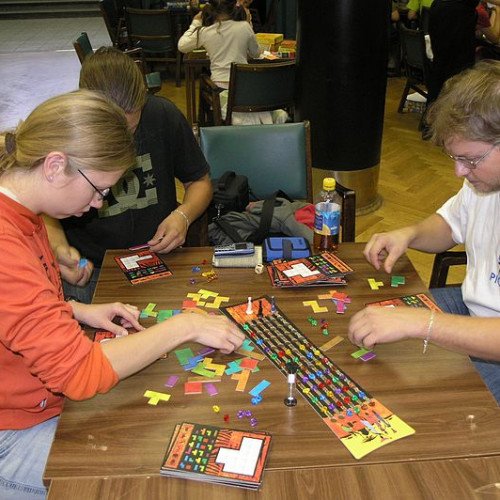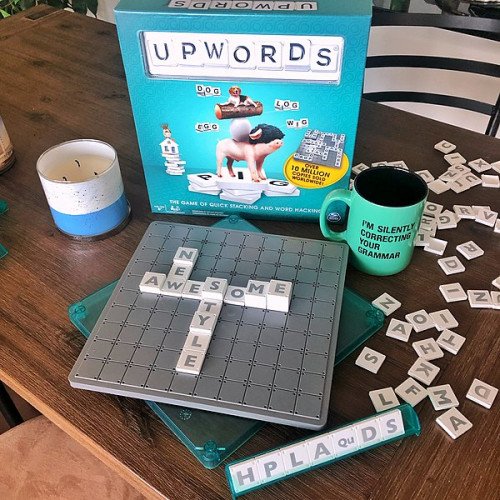"UBONGO" vs "UPWORDS"

UBONGO
Ubongo is a board game developed by Polish-born Swedish game designer Grzegorz Rejchtman. It originally appeared as Pyramidens Portar by the Swedish publisher Kärnan and won the Swedish Årets spel prize in 2003. The game was later released in Germany in 2005 as Ubongo by the publisher Kosmos and got 4th place at the German board game competition and was among the finalists in the International Gamers Award. The game is for 2 to 4 players of ages 8 and above, and takes about 20 to 30 minutes. Ubongo is an abstract puzzle game, based on a pentamino variant, reminiscent of a combination of Tangram and Tetris. The game includes a simplified version with fewer pieces, for children and beginners. Ubongo is well suited for a game for the whole family, because its mechanics entertain both children and adults. Solving puzzles is entertaining by itself and provides excitement when combined with competition with other players. The word "ubongo" means "brain" in Swahili, a language currently spoken in Eastern and Central Africa. The game includes 36 cardboard pieces, of which four have to be used to completely cover the shape on the player board. On the other side of the player board is a simpler version, which has only to be covered with three pieces. Each player receives a player board, and a throw of a die decides which four pieces have to be used to cover the shape. The player must then use the pieces to completely cover up the shape without overlapping the pieces. An hourglass is used to limit the time to cover the shape. Each player to manage to cover up the shape in time receives the right to take jewels from the main board. Where the player can take jewels from depends on his/her rank among the players to complete their shape. Then the player cards are redistributed for the next turn. At the end of the game, the player who has the most jewels of a specific single colour wins the game.
Statistics for this Xoptio

UPWORDS
Upwords (at one time branded as Scrabble Upwords in the United States and Canada; and Topwords Crucimaster, Betutorony, Palabras Arriba or Stapelwoord in other countries) is a board game invented by Elliot Rudell and originally published by the Milton Bradley Company, now a division of Hasbro. Worldwide marketing rights to Upwords have been licensed to Spin Master Inc. by Rudell Design, LLC as of 2018. Upwords is similar to Scrabble or Words With Friends, in that players build words using letter tiles on a gridded gameboard. The point of difference is that in Upwords letters can be stacked on top of other letters already on the gameboard to create new words. The higher the stack of letters, the more points are scored. This typically makes words built in later turns of the game more valuable than earlier words, increasing play intensity and adding a level of strategy unique to Upwords. The memorization of two-letter words is considered a useful skill in this game. Unlike Scrabble, which is manufactured in the U.S. and Canada by Hasbro and elsewhere in the world by Mattel, Upwords is solely controlled by Spin Master. As of August 2019 the game is being relaunched and will be available in other countries around the world. In the past and while under license from Hasbro, Upwords was available in about twenty languages. There have been national tournaments played in Hungary and Turkey. Each player draws a tile; the one with the letter nearest to A will be the first to play. The tiles are returned to the draw pile. Each player draws seven tiles to start the game. The first player forms a word with one or more of their tiles. The word must cover one or more of the four central squares. The player then draws more tiles to replace those played. Play continues to the left. Subsequent players may put tiles on the board adjacent to and/or on top of the tiles already played, as long as all words formed are found in the dictionary being used and the rules below are followed. All words must read horizontally from left to right, or vertically from top to bottom. All tiles played on a turn must form part of one continuous straight line of tiles across or down. For example, if the word CATER is on the board, a player could put a B and E in front of CATER and then put an L on top of the C and a D on top of the R to build BELATED. Restrictions on words are as follows: No words that are always capitalized No hyphenated words No words requiring an apostrophe No abbreviations or symbols No prefixes or suffixes which cannot stand alone No foreign words unless they are in the dictionary The 2008 edition included a new rule: Players may not pluralize a word simply by adding an S at its end. However, such a play is allowed if the S is part of another complete word that is played onto the board in the same turn. This rule is intended to prevent players from capitalizing on one another's words without changing them or playing new ones. Restrictions on stacking tiles are as follows: No stack may be more than five tiles high. No tile may be stacked directly onto a duplicate of itself. At least one tile or stack must be left unchanged; a player may not cover every letter in a word on a single turn. A player may choose to pass at any time, or discard one tile and draw a replacement instead of playing. Once the draw pile is exhausted, the game ends when any player runs out of tiles, or every player passes in a single round.